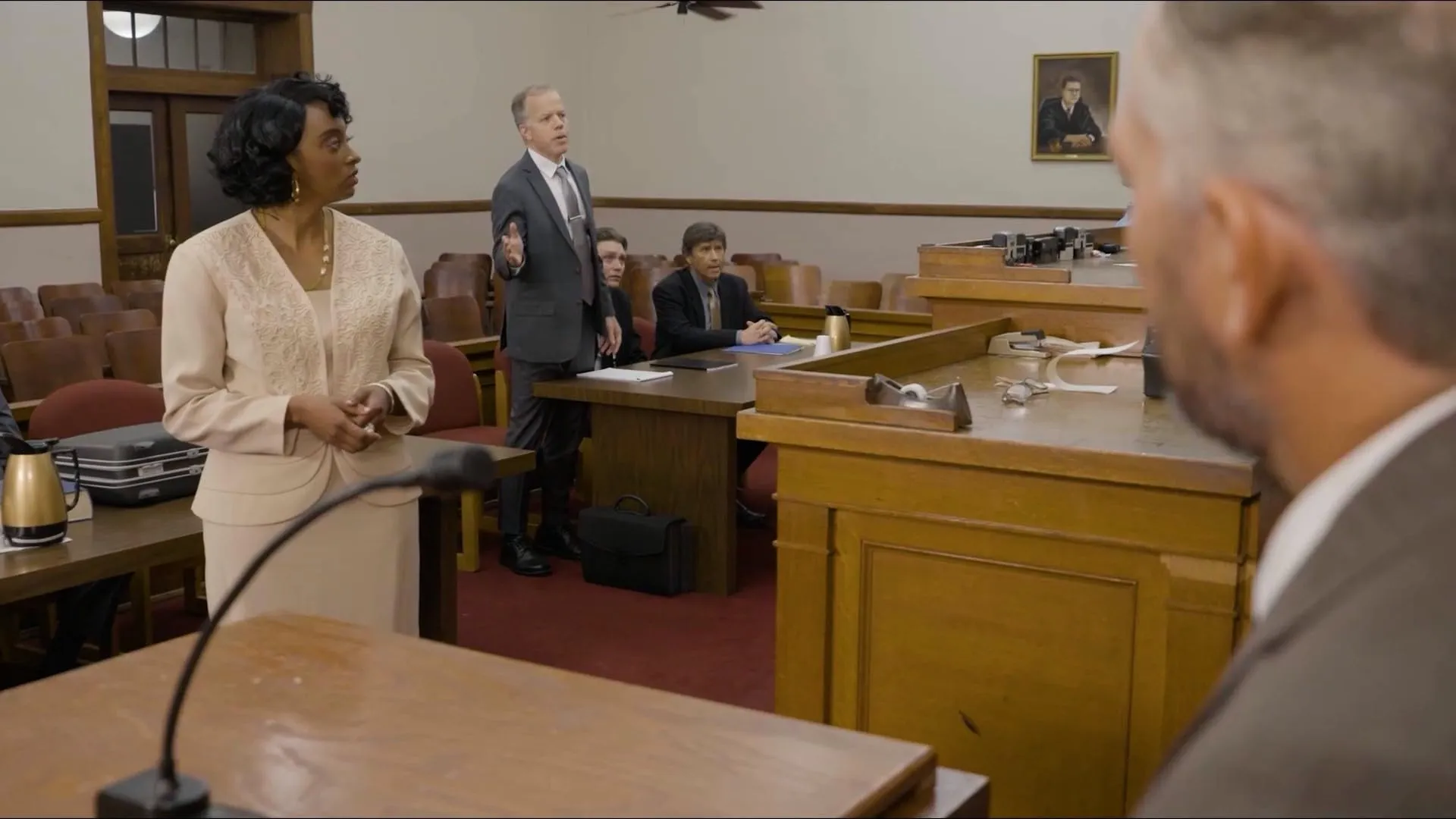“Dovey’s Promise” unfurls within the charged corridors of 1965 Washington D.C., a city, and a nation, simmering with social upheaval and deep-seated racial inequities. This historical legal drama plunges into this volatile milieu with the arrest of Raymond Crump, a young African-American man accused of the brutal murder of Mary Pinchot Meyer.
Meyer’s identity as a confidante, and reputed lover, of the recently assassinated President John F. Kennedy, instantly elevates the case beyond a simple homicide, casting a long shadow of political implication and societal scrutiny. Into this maelstrom steps Dovey Roundtree, a formidable African-American female attorney.
Her decision to defend Crump, for a symbolic dollar, pits her against a legal system and a societal structure heavily weighted against her client, in an era where justice was too often filtered through the lens of race and power. The film immediately establishes an atmosphere thick with unspoken threats and the palpable fear of a foregone conclusion, sketching the contours of an arduous battle for truth.
The Measure of a Woman, The Caliber of a Cast
At the heart of “Dovey’s Promise” beats the extraordinary presence of Joy White as Dovey Roundtree. It is a performance of quiet command, her expressive eyes and softly modulated yet unyielding voice forging a character of immense gravitas.
White does not merely play a role; she embodies a spirit of unwavering moral integrity and sharp intellect, making Dovey a believable pillar of her community and a fierce advocate for the marginalized. This portrayal presents Dovey not as a flawless saint, but as a deeply empathetic human being, keenly aware of the systemic injustices she confronts.
The ensemble supporting White fortifies the film’s emotional core. Terrence Mombrun imbues Raymond Crump with a gentle meekness, his apparent innocence rendering Dovey’s dedication all the more compelling. Karl Lucht, as Dovey’s astute paralegal Terrence Reilly, offers a dynamic of steadfast professional support, perhaps tinged with a deeper admiration.
Eric Wilkerson’s Judge is a figure of balanced authority, lending credibility to the courtroom proceedings, while Lance Henry’s prosecuting attorney projects a conviction in Crump’s guilt that intensifies the legal confrontation. These performances mesh to create a human tapestry against which the fight for justice plays out.
The Arena of Argument: Where Truth is Fought
The courtroom sequences form the undeniable spine of “Dovey’s Promise,” crackling with a sustained, intellectual tension. These are not staid legal recitations; rather, they are arenas of sharp argument and carefully navigated witness examinations, each moment meticulously crafted to advance the narrative.
The film exhibits an admirable narrative economy, each scene serving a distinct purpose, ensuring the pacing remains taut and engaging without feeling rushed. There is a palpable sense of fraught energy as testimonies unfold, avoiding the pitfalls of repetition that can plague courtroom dramas.
Cinematographic choices, such as the judicious use of low-angle shots to subtly underscore a character’s momentary dominance, or high-angle perspectives to convey vulnerability, work to enhance the inherent drama. These visual cues, paired with close-ups that invite an objective scrutiny of faces under pressure, draw the viewer directly into the high-stakes intellectual combat and the pursuit of elusive truths.
Imperfect Veneer, Indelible Spirit
“Dovey’s Promise” operates with the visible constraints of an independent production, and this is most apparent in its aesthetic rendering of the 1965 setting. The period authenticity is, at times, less than immersive; a certain flatness in lighting and inconsistencies in period detail, such as occasional modern items, can momentarily disrupt the carefully constructed past.
Yet, to dwell on these surface imperfections would be to miss the film’s more profound achievements. The strength of the narrative, anchored by the compelling performances, largely transcends these limitations. The film succeeds powerfully in its thematic explorations, shining a light on the pervasive racial prejudice of the era, the courage required to challenge entrenched power structures, and the vital importance of due process.
By resurrecting an overlooked historical case and introducing the remarkable figure of Dovey Roundtree to a wider audience, the film achieves a significance that extends beyond its technical execution. It serves as a potent reminder of past struggles for justice and their enduring relevance.
Dovey’s Promise premiered in Austin on March 17, 2025, and received a limited theatrical release on April 15, 2025. Dovey’s Promise is available for streaming on digital platforms such as Fandango at Home
Full Credits
Director: Ralph Cinque
Writer: Ralph Cinque
Producers and Executive Producers: Michelle C. Lipscomb (Producer); Executive Producers
Cast: Joy White, Karl Lucht, Terrence Mombrun, Eric Wilkerson, Lance Henry, Elisabeth Joy, Christopher Phipps
Director of Photography (Cinematographer): Troy Bakewell
The Review
Dovey's Promise
"Dovey's Promise" is a potent historical drama anchored by a commanding central performance and a compelling courtroom narrative. While its independent production values sometimes betray the ambition of its 1960s setting, the film's vital story of justice, racial struggle, and the tenacity of one remarkable woman resonates with undeniable power and significance, making it a noteworthy cinematic excavation of a crucial, lesser-known legal battle.
PROS
- Exceptional lead performance by Joy White as Dovey Roundtree.
- Gripping and intelligently paced courtroom sequences.
- Explores significant themes of justice and racial prejudice with conviction.
- Strong supporting cast enhancing the central drama.
- Highlights an important, overlooked historical figure and case.
CONS
- Production limitations sometimes hinder full immersion in the 1965 period.
- Inconsistent period details and flat lighting can detract from visual authenticity.
